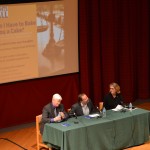 On November 18th, 2015, the Desmond Tutu Center and the Indianapolis Star launched the first in a series of four “#RightsForAll” forums entitled, “Do I Have to Bake You a Cake?” A Conversation About Civil Rights and Religious Liberties. The discussion centered around the legislative aspect of religious liberties and how they affect the rights of the LGBT community.
On November 18th, 2015, the Desmond Tutu Center and the Indianapolis Star launched the first in a series of four “#RightsForAll” forums entitled, “Do I Have to Bake You a Cake?” A Conversation About Civil Rights and Religious Liberties. The discussion centered around the legislative aspect of religious liberties and how they affect the rights of the LGBT community.
There were two panelists and a moderator at the forum, Jane Henegar, John Hill and Tim Swarens. Jane Henegar, Executive Director of the American Civil Liberties Union of Indiana and former Deputy Mayor of Indianapolis, was the first panelist. Ms. Henegar received her law degree in 1988 from Indiana University Maurer School of Law. The second panelist, John Hill, is a professor of law at IU Robert H. McKinney School of Law, where he teaches civil procedure, Constitutional law, criminal law, as well as upper division courses on the First Amendment. He holds a J.D. and Ph.D. in philosophy, both from Georgetown University. The moderator for the forum was Tim Swarens, Opinion Editor of the Indianapolis Star.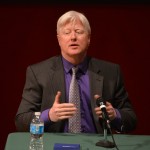 The discussion focused on defining public accommodation and whether or not, and to what degree, it is protected against discrimination based upon sexual orientation. There were also questions posed about the balance of religious liberty and LGBT rights, and how they sometimes contradict each other.
The discussion focused on defining public accommodation and whether or not, and to what degree, it is protected against discrimination based upon sexual orientation. There were also questions posed about the balance of religious liberty and LGBT rights, and how they sometimes contradict each other.
John’s stance focused on the rights of religious practitioners, and how people should not be obliged to offer a specific service when it contradicts their religious belief. He cited the example of a woman asking two Christian bakers to bake a cake for her marriage with another woman. John believed that since baking the cake would have been a sin in the eyes of the bakers, then their religious views should be upheld and respected. John believed that such a law could unjustly drive certain people with a specific viewpoint out of business. John believes that the religious protection provided in the Constitution is synonymous with our freedom of speech, and that citizens are legally allowed to say whatever they want. John would like to see specific legislation passed creating an exemption status for religious business owners who want to refuse service based upon a religious belief.
Jane’s stance was quite different than John’s. In Jane’s opinion, discrimination based upon sexual orientation or gender should not be 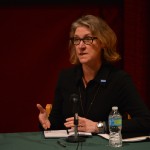 treated any differently than discrimination based upon race. Jane believes that both aspects are intrinsic to a human being and therefore should be protected equally under the law. Jane made the point that when someone creates a business that is open to the public, they should not be able to withhold or discriminate in any manner. Religious liberty should not be able to override or counteract gay rights. In cases where discrimination has taken place, Jane viewed it as harmful to the dignity of the person who was discriminated against, therefore infringing upon his/her civil rights. Jane expressed a necessity for LGBT civil rights to be treated the same as racial civil rights, as both are equally important.
treated any differently than discrimination based upon race. Jane believes that both aspects are intrinsic to a human being and therefore should be protected equally under the law. Jane made the point that when someone creates a business that is open to the public, they should not be able to withhold or discriminate in any manner. Religious liberty should not be able to override or counteract gay rights. In cases where discrimination has taken place, Jane viewed it as harmful to the dignity of the person who was discriminated against, therefore infringing upon his/her civil rights. Jane expressed a necessity for LGBT civil rights to be treated the same as racial civil rights, as both are equally important.
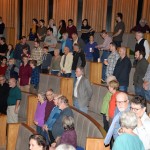 Both panelists made very good arguments defending their stance, and the discussion raised many questions. During the Q+A session at the end, many in the audience enthusiastically asked the panelists to further explain some points. One person asked, “Why is baking a cake a religious act?” John seemed to think that by knowing what the cake would be used for, the baker was automatically implicating him/herself in that event. Jane strongly disagreed, saying that baking the cake was a business task that the baker had agreed to do for any and all clients, and therefore the was no religious association whatsoever. Another question was posed to John, asking him what legislation wording would alleviate his concerns. John replied that it was necessary to provide exemption to people who did not want to violate their beliefs, but only for businesses of a specific size. One of the last questions centered around public accommodation, regarding how comprehensive it should it be. Jane believed that public accommodation is all-encompassing, and therefore one cannot use a religious excuse to discriminate over something as immutable and intrinsic as sexual orientation.
Both panelists made very good arguments defending their stance, and the discussion raised many questions. During the Q+A session at the end, many in the audience enthusiastically asked the panelists to further explain some points. One person asked, “Why is baking a cake a religious act?” John seemed to think that by knowing what the cake would be used for, the baker was automatically implicating him/herself in that event. Jane strongly disagreed, saying that baking the cake was a business task that the baker had agreed to do for any and all clients, and therefore the was no religious association whatsoever. Another question was posed to John, asking him what legislation wording would alleviate his concerns. John replied that it was necessary to provide exemption to people who did not want to violate their beliefs, but only for businesses of a specific size. One of the last questions centered around public accommodation, regarding how comprehensive it should it be. Jane believed that public accommodation is all-encompassing, and therefore one cannot use a religious excuse to discriminate over something as immutable and intrinsic as sexual orientation.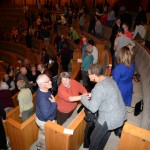
It seems that there is still much controversy over the issue, and it will be interesting to see how it unfolds over time. There may not be one right answer, but the Desmond Tutu Center was glad to see the discussion raise awareness over this debate, and bring people together and involved in community affairs.
Watch the entire conversation HERE.
By: Angie Brown



